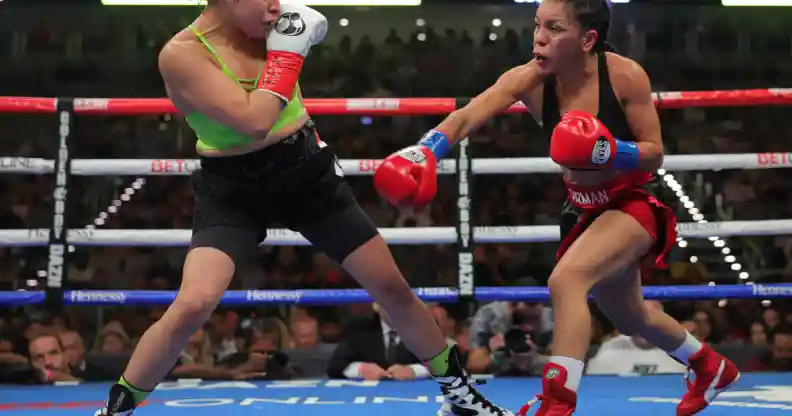World Boxing Council bans trans athletes from same-sex fights amid ‘safety concerns’

World Boxing Council (WBC) has moved to limit trans boxers competing in tournaments. (Cris Esqueda/Golden Boy/Getty Images)
The World Boxing Council (WBC) has effectively banned trans athletes from its competitions due to “serious health and safety concerns”.
On Monday (15 August), the international professional boxing organisation announced new guidelines on the eligibility of trans boxers in its tournaments.
Despite saying it “firmly and unequivocally supports transgender rights”, the WBC said neither trans women nor trans men can compete against cis athletes as it would be “unfair”.
“A combat sport bout should occur between two equally matched competitors,” it said in a statement, adding: “At present, there is no consensus whether a bout between a transgender woman against a cisgender (biological) woman is a fair bout between two equally matched competitors.
“Metric such as testosterone level less than 10 nanomoles per litre (achieved by using testosterone suppression medication in the transgender woman), in isolation is inadequate to ensure fairness at the time of the bout.
“It can be argued that by the time a transgender woman combatant launches her professional career she has already gone through male puberty thus conferring her with the musculature and bony structure of a male.”
The same goes for trans men, the WBC added. “At present, there is no consensus whether a bout between a transgender man against a cisgender (biological) man is a fair bout between two equally matched competitors,” it said.
The WBC, which is among the four top organisations that sanction boxing bouts, said that cis men may have an “unfair advantage” over trans men.
Given that boxing “carries an exceedingly high risk for both acute and chronic neurological injuries”, the organiser said: “The WBC advocates for two equally skilled and matched athletes competing in the cage or ring, on a level playing field and to keep matches fair, competitive, entertaining, and most importantly safe for all combatants.
“At present level of scientific knowledge, the WBC consensus is that allowing transgender athletes to compete raises serious health and safety concerns.
“The WBC will keep researching with the upmost professionals in healthcare to have a greater understanding of the matter and will keep looking for fairness in the sport and equality.”
Whether a trans person should be able to compete in professional sports has become the latest flashpoint in trans rights, with the International Swimming Federation (FINA), the International Rugby League, and FIFA, among others, restricting or banning trans folk.
In one sense the WBC is right – there is little to no research on trans elite athletes. But one expert previously told PinkNews that what research has been done into trans sportspeople shows banning them altogether is a solution to a problem that doesn’t exist.
Such discriminatory policies tend to rely more on the assumed differences between men and women rather than cis people and trans people, they said.
The impact of testosterone on athletic performance is still little understood by scientists. Some studies suggest it isn’t even the fabled reason for performance differences in athletes in the first place.
Nevertheless, sports governing bodies have often used the hormone as the benchmark of how strong an athlete is, often requiring trans people to reduce their testosterone levels to compete.
Though trans people kicking balls or doing a few laps in the pools continues to dominate headlines, the actual number of trans athletes is few and far between.
In American women’s college sports, there are around 200,000 athletes competing. Of them, one researcher estimates, there are about 50 trans people.
PinkNews has contacted the World Boxing Council for a comment.

